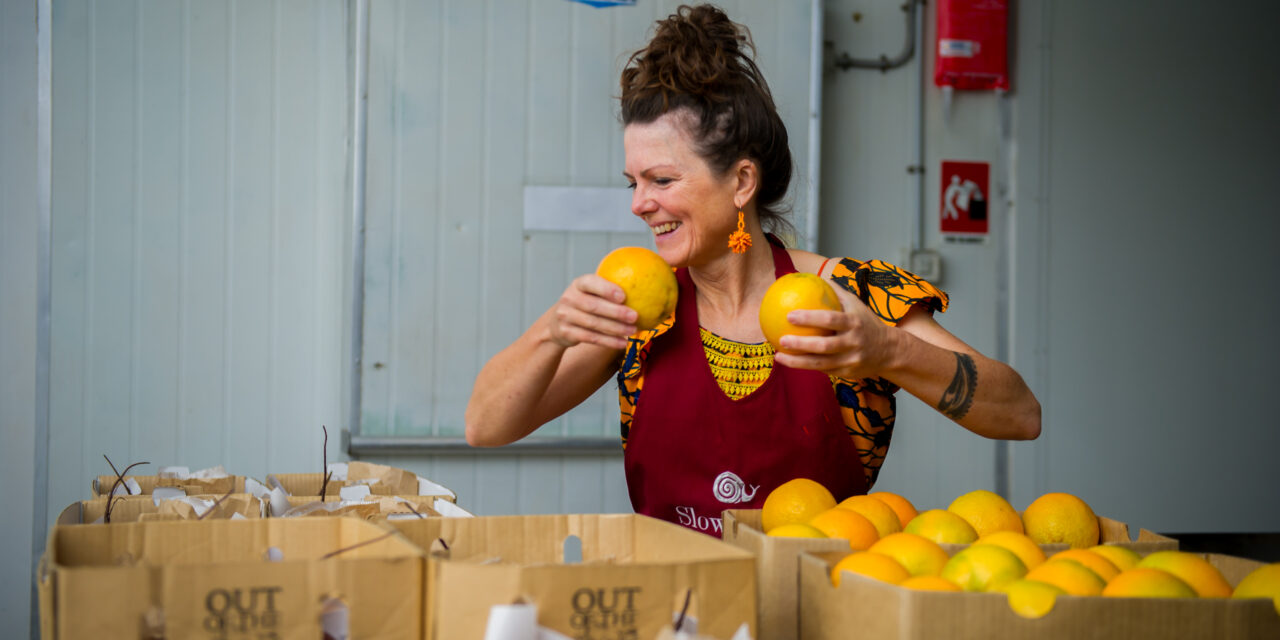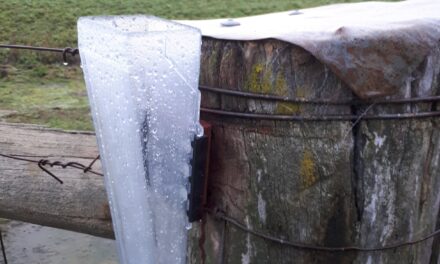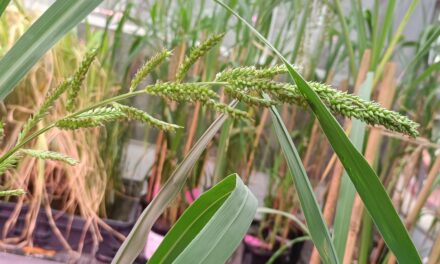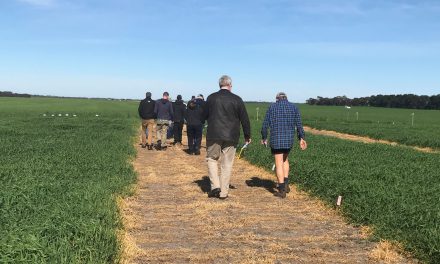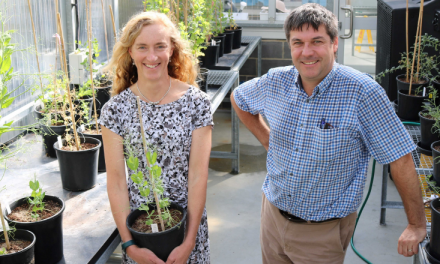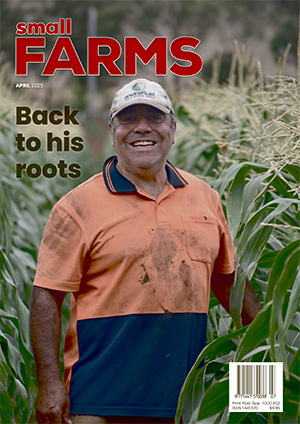Is the Sunraysia a national food bowl? Absolutely. But if you live there, is your food bowl a local farm, or is it the local supermarket? And when is fresh a fact, rather than a marketing solution, when it comes to the food you cook every day of the week? ANDREW MOLE has the answers.
There’s a good chance the fruit and vegies you do buy at any of Mildura’s supermarkets did begin life somewhere in the Sunraysia.
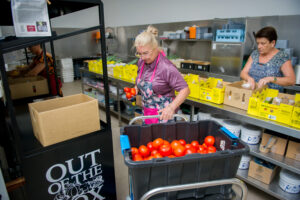
Yet only reached your kitchen via transport trucks to Melbourne, cold storage at key hubs there, plastic wrap in distribution warehouses, back on a truck, back up the highway and back on the shelves.
Days, weeks, even months later.
One local grassroots movement, however, has turned the Sunraysia food bowl into a more bite-size food box.
Out of the Box is all about local people getting fresh food from local farmers.
Local, local, local.
Deb Bogenhuber began her food evolution/revolution with the Slow Food movement, which she first crossed paths with while living in the United Kingdom.
But after moving to Mildura 15 years ago, it was her 2015 connection with a Victorian Government local food activation program that got the show on the road.
“The initial concept was to go into the community and see if there were existing networks which could be strengthened, or did new ones need to be built, to make all the connections,” Deb explained.
“We set up talking circles looking at local food, would have meetings, guest speakers and gauge the community response to what people might want, as opposed to need, and see if there was any impetus to achieve that.
“In our case, after some time, a person who was new to the conversation, asked why there was no organic vegie box available in town.
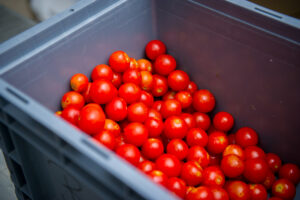
“It was a great question, it clicked with a lot of people and we followed that up with a mapping exercise and expectations — going totally organic was initially a challenge, but people were prepared to work around that.
“But the one thing everyone made very clear from the very start was local.
“All the food that would eventually go into the program had to be local — that was a non-negotiable.”
A three-month trial was set up, with an initial 30-box service planned to help organisers get a real feel for demand.
Deb said that created another hurdle — the 30 boxes were subscribed within 24 hours, at which point reality caught up with the enthusiasm.
“We suddenly found out we couldn’t get enough food to fill just 30 boxes once a week in our centres,” she said.
“The trick now was how do we get more people to grow food for our community — we had to jump from growing customers to growing growers.
“And growers, like customers, will come and go as well. Right now we have three core suppliers and about a dozen others we can tap into as needed.”
The core suppliers are a story in themselves, according to Deb.
She said the first one had less than a hectare in production, and they initially got into market gardening to show kids of today where their food really comes from.
The second one is a guy who grew up on a grape block but has had a lifelong fascination with all farming “and he now runs a diverse enterprise which not only supplies us, but also has restaurants, cafes and farmers markets as part of its customer base — he even does a few boxes of his own”.
“The third core supplier is, well, is really one that is right out of the box,” she laughed.
“It is a movement called Food Next Door Co-op, which is a charity working with new migrant farmers helping get them access to land to grow food.
“In our case these farmers are all East African and they have individual plots on a five-acre [2ha] block which has been developed as a market garden as well.”
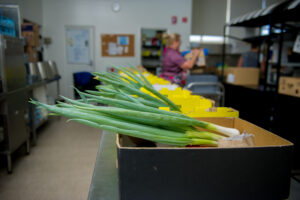
Deb described Out of the Box as a “sort of incubator or a core farm for our growers” which completes the local circle that is the concept behind the overall program.
“We work with them as much as we work with our customers, and we have a price list for both buy and sell and everyone knows what it is so we can make sure everyone is happy, that everyone gets a fair price.
“Those negotiations also mean there will be a price rise this year at both ends.”
The consistent customer base makes the project far more manageable. Each week Out of the Box can contact its suppliers and let them know, for example, the next four weeks they might need 60 capsicum, 60 zucchini and 30kg of potatoes each week for that period.
The customer knows the food is coming, the grower can plan knowing a fixed percentage of each week’s production is paid for well before the week begins, and it’s a bit like succession planting.
“This is run as a genuine social enterprise and we have three box sizes — small, medium and large,” Deb said.
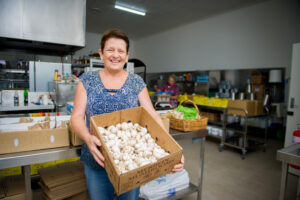
“The funny thing is in the last six months, where we’ve seen the most consistent high-quality produce being supplied, many of the customers who had small boxes have now upped their orders to medium.
“That’s good for us and good for the growers — even better for the local economy.
“Also, the food we supply, apart from fresh and organic, might not necessarily be the perfect presentation demanded by the mainstream retail trade — you might get the occasional kooky looking carrot, or lopsided apple, but they taste just as good and are just as good for you.”
Although Deb has been at the helm for most of the past five years, her partner Grant took over the management role in May last year while she took a breather.
But only a short one, because there’s always something else to do.
“Out of a Box in Mildura has achieved a critical mass, doing around 65 boxes a week, and the model we used to get this all up and running also shows you can go back into your community and push it to become a bigger project, or replicate it in another part of the community and have two or three or however many networks running,” Deb said.
“I’m an ecologist who loves eating good food, and even done a little bit as a cook myself, plus my Slow Food experiences in the UK have given me a real focus on food that doesn’t just taste good, it is good for the social aspect of the community and it adds to the biodiversity.”

